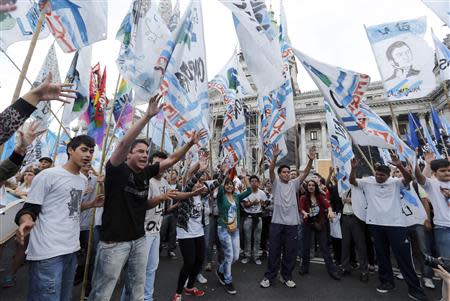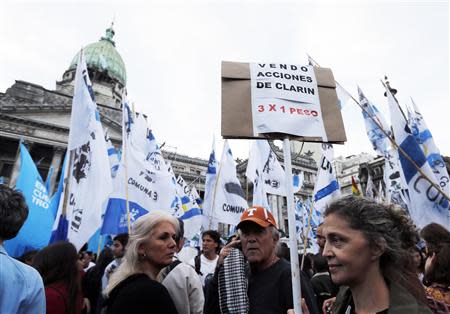Argentina's Supreme Court upholds controversial media law
By Guido Nejamkis and Anthony Esposito BUENOS AIRES (Reuters) - Argentina's Supreme Court on Tuesday upheld a controversial media law that government proponents applauded as an effort to reduce market concentration but opponents viewed as state meddling aimed at quieting dissent. The ruling, which will require media conglomerate Grupo Clarin to divest some of its units, comes as a relief for President Cristina Fernandez's government only a few days after a setback in midterm elections. The government has championed the reform as the start of a new era of media diversity. A statement from the court said it had deemed four clauses that it was reviewing in the anti-monopoly broadcast law to be within the terms of the constitution. "A law that set limits a priori is legitimate because it favors freedom of speech by limiting market concentration," the court's ruling said. Clarin, the country's biggest media group, has argued that the law's most controversial clause, Article 161, violates the constitution by forcing companies to sell off previously acquired radio, television or cable TV operating licenses. The law has been tied up in Argentina's courts for years. Fernandez, who is convalescing from an October 8 operation to remove blood that pooled on her brain, used to have harmonious ties with Grupo Clarin and its chief executive, Hector Magnetto. All that changed in 2008 when Clarin's news outlets turned against her government over its handling of tax protests by farmers. The media conglomerate has resisted pressure from Fernandez to comply with the law, which would force it to divest dozens of operating licenses or have them auctioned by the state. Critics of the reform have accused Fernandez's center-left government of trying to stifle dissent and see the law as a thinly veiled attempt to punish Clarin and other powerful opposition voices. Backers of the 2009 law say it aims to do the opposite by diversifying the airwaves. Clarin owns Argentina's main cable television operator, its most read newspaper, the most popular radio stations and two television channels with the widest audiences. As well as aiming to limit market share and the number of radio and television licenses any one company can hold, the law allocates airspace for non-government groups such as churches and community associations and seeks to promote Argentine-made films and television series. NEW LEGAL BATTLE ON THE HORIZON? Clarin called the ruling an affront to freedom of speech and said it is considering other legal options, including bringing an appeal before international courts. "Grupo Clarin laments the ruling, which doesn't take into account the value of journalistic independence as a precursor for freedom of speech, and as such seriously questions the real possibility of criticizing political power, an indispensable democratic assumption," the media group said in a statement. Meanwhile, the AFSCA watchdog in charge of enforcing the legislation hailed the ruling as a win for democracy and said time had run out for Clarin to adhere to the law. "The ruling closes a phase of uncertainty and starts a very important period for the country and for democracy in terms of media," said Martin Sabbatella, head of AFSCA. Fernandez appointed political ally and congressman Sabbatella a year ago to head the body. "The obstacles put in place by a business conglomerate that refused to abide by the law have been cleared away," he added. However, local court sources said that depending on how the law is applied a new legal battle could be initiated. In its ruling, the court said, "It is of vital importance that the authority that applies (the law) be a technical and independent organ, protected from undue government or lobby interference." Sabbatella's close ties to Fernandez and the president's sometimes rancorous relationship with local courts could raise questions about how fairly the law is being applied. "We respect the court's ruling but we don't agree with it, especially considering the state of freedom of speech in Argentina deteriorated after a permanent government assault on critical and independent voices," said Claudio Paolillo, president of the Inter American Press Association's commission on freedom of press and information. Following the ruling, Clarin's shares fell 5.76 percent before trade in them was suspended by the Buenos Aires bourse. (Additional reporting by Nicolas Misculin; Writing by Anthony Esposito; Editing by James Dalgleish, David Brunnstrom and Cynthia Osterman)



